Tonight was a comedown. I had lots of time over the weekend and took advantage of it, and tonight–not so much. Heather and the kids are sewing masks for family and friends so there are dueling sewing machines on either end of the living room table. Challenging writing environment, but I'd rather be in the middle of things trying to write instead of the cliched lonely writer in his garret keeping company with rats and roaches but with no other distractions. I like my life occasionally, depressed and psychotic though I am most of the time. Thanks be to therapists and doctors and other miracles of pharmaceutical origins. I'm not going to go on at length except to say that I worked for my words tonight, and I can only hope the struggle doesn't show when I get to the final draft, however far off or uncertain that may be.
1717
Hello. One of the things you'll notice that's consistent about this blog is its inconsistency. A new year or a milestone hits and I'm eager to blog it and talk to the world, most of which I've been doing lately via Instagram and Facebook, leaving this, my main site, static and uninteresting. So here I go again, pledging to update with relevant news.
What's going on here right now is my stretch run toward novel number seven, four of which have seen the gray light of publication. Number seven promises to be my most complex and longest novel yet. No more of the shortie novels, at least not this time around. What I'll say about it right now–it's called Comes the Flood–is that it's unfashionable as hell. It's a PI novel set in Revere MA, where I have lived since 1996, provides lots of local color in a time of very exciting and dynamic times, some of which I hope to comment on via the main action, though the tourist board and chamber of commerce is not very likely to point to it as a guide or pinpoint accurate representation of the absolutely lovely city in which Heather and I have chosen to raise our children.. I'm 36.5K into it, long enough to be able to see that it's sustainable over the long haul, and early enough that I remain carefully excited about the possibilities. It's time for the hard slog of the middle now, and I hope to document daily or near-daily progress reports here.
Today was a weekend day, which meant I had a little longer to write. I got 1717 words in two sessions, and what I'm most interested in is getting back to the outline. I had a productive side-spin on the plot which sustained me for couple days, and now it's time to come back to the main thrust with additional momentum. This is the first of my six, soon to be seven, novels to be outlined. I won't do another novel without one, I don't think. It's been two days of high-energy movement and promises to be even more fun going forward. I hope. So welcome to the blog, the blog with newfound purpose. I come to it as I do to many things, a day late, unfashonably so, and a dollar short, but with a lot of enthusiasm. Hit me up if you have questions.
News Items Various and Sundry
So it’s been some time since I updated. It’s been a hell of a year. My health went to hell in a hand-basket, and I wrote a ton of poems as a result. I read many books, and bought many more. The family went through some junk, and I went through some junk. Boy howdy.
On to the important stuff: even through the hellish landscape that has been 2019, I have gotten work done since my last update. A poem appeared in Black Coffee Review’s Fall 2019 issue called “Pissing In Public Urinals,” which was received with many quizzical looks and sidelong grins, but generated more praise than many things I’ve written more recently. My story “Easy Tiger” appeared in The Desperate and the Damned anthology. ‘The Russian’ appeared in Mystery Tribune in Summer 2019, and finally, the pieces de resistance, the two books I have that have come out this fall, Kraj the Enforcer: Stories, out in October from Shotgun Honey/Down & Out Books, and Apocalypse in A‑Minor, a miscellany of poems,from Analog Submission Press, due out on November 18th. Here is the cover copy for Kraj:
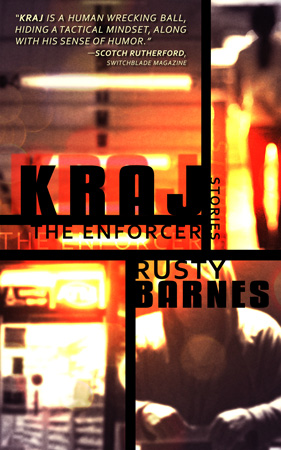
Meet Kraj—pronounced krai—a low-level errand boy and hit-man masquerading as a bouncer for Tricky Ricky Gutierrez, nefarious owner of the Twist, a club in upstate Elmira NY. A place that has both a LGBTQIA night and a cowboy country night, this cockeyed corner bar in northern Appalachia supports Ricky’s illegal schemes, and serves as a rural balm for Croatian-war refugee Kraj.
Kraj plies his trade over a short span, moving from petty theft to strong-arming tips from people at the door, breaking up redneck fights, protecting the club’s nubile female staff and collecting gambling debts owed Tricky Ricky. Kraj eventually gets sucked further and further into Ricky’s underworld plans, where he wants to be seen as a man on the come-up, but he has problems moving up in Ricky's organization will never solve. His sister Ana, missing since the Croatian War for Independence, never strays far from his mind.
Kraj, together with his sometime girlfriend Cami, newly become manager of a franchisee McDonald’s, and his manager Mikael. negotiates his way through underground fight clubs, prostitution rings, drug deals, petty thievery, and of course, murder. Tricky Ricky gives Kraj a great deal of rope and autonomy to operate.
Will he hang himself with it or swing?
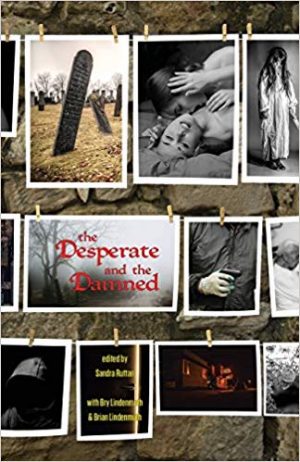
As far as the future goes, I have two stories in the final stages of consideration for different anthologies, plus the story “Big Poppa” coming out in Goliad Review. I also have a novel. The Enforcer’s Revenge featuring Kraj, the protagonist of my most recent book, in edits. I said I’d given up on that one due to a number of complicating factors. but I may have found ways around. It will take time and opportunity that I don’t have right now, so it may be a year or two before I can fix it. I also have another full, if short, novel finished, one whose bones are strong, but no agents are interested, because it only runs 55K. Too short for submission. It’s called Sunset Approaching, and it hearkens back to my earlier work, a more Appalachian book in setting and tone. I hope to place that with a university or independent press sometime in the near future.
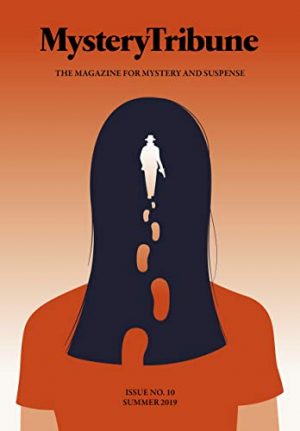
And finally, I’m in the midst of collecting a bunch of Appalachian stories that I’ve published in various journals since Mostly Redneck came out, some crime and some not. They fit pretty well as a collection, so I’ll be shopping that around soon enough too. I have a private investigator novel I’m working on sporadically. set here in Revere, where I live and write. I have high hopes for that, at least high compared with my goals for 2019, which was basically to survive. I’ve done that, despite innumerable challenges, and I remain hopeful in spite of crushing depression, anxiety, and psychosis, and I only hope I stay well enough to do the work that is in me to do.
Hello Again

I promised to post more during this period of time, but…stuff got away from me. On the publishing news front, I've managed to place poems in four journals over these last few months, Plumb, Ginosko, BEAT to a PULP amd FRiGG. I'll also have another Kraj story in Mystery Tribune coming up soon, and another in Goliad Review this fall.
I'll be at Bouchercon in the fall too, late October, early November, so look me up or drop me a note via social media beforehand. I'd like to get together, as I don't get to mingle very often. That's about all for now.

Happy New Year!
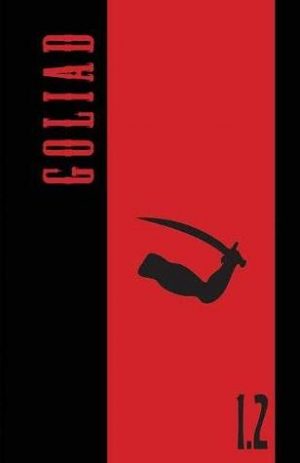
I pledge to post a little more, which means I have to have news to share or pertinent info. You can find two recent stories, one in Goliad Review, a long story I'm particularly proud of at 9000 words, and another in Mystery Tribune. Otherwise, I've added a page for my newest novel The Last Danger, sequel to Ridgerunner, in which Matt Rider gets into even more trouble with the renegade Pittman clan and clings to his instincts to the detriment of nearly everyone around him. Jay Gertzman wrote up a nice précis of the novel on Amazon if you care to look it up. I'll reproduce some relevant bits here.
_Ridgerunner_, the first novel in this proposed trilogy, showed Matt Rider as a man capable of protecting his family from the belligerent, bullying Pittmans, who control the regional drug distribution in upsate NY and PA. Matt confronts them with the steely (as in guns) resolution of a Western homesteader protecting his domain from cattlemen who want to run him off it. Perhaps the name Matt Rider is meant to suggest this kind of classic rural American independence, which came through violence. The Pittmans kill Matt’s brother and Matt has killed two of them. As _The Last Danger_ opens, Matt knows he is a hunted man. He also knows, as another fighter against criminal says, PI Phillip Marlow says, “I was part of the nastiness now.”
His brother, wife, and daughter all wonder what Matt has become. Traps are many-layered in this novel. The Pittmans have forced him to do drug runs. That at least protects wife and daughter. But Matt exposes them, and his loyal best friend, to increasing dangers as the novel proceeds. So his desperate need to protect just increases a quicksand-like immersion. His own violence increases, and he relishes it. The more he tells himself he is protecting the family (which is his chief aim), the more his behavior makes that sincere conviction a Kafkaesque entrapment.
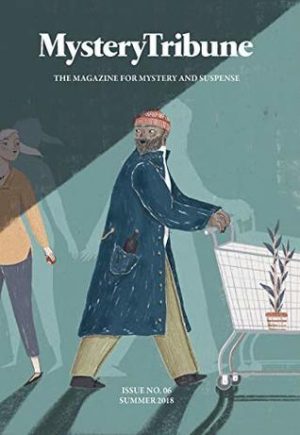
I hope to publish even more in 2019, including a collection of Kraj stories as well as some poems and short stories. I'll attend at least two, possible three conferences in 2019, so getting to hang out and have a beer with some of you is a very real possibility. Thanks for hanging in there with me, and here's hoping for the best in 2019
In the House of Wilderness, by Charles Dodd White: Q&A
 What were the originating images in this novel? I imagined as I was reading it had to be the opening eight pages, where you set up the conflict beautifully, but I'm prepared to be wrong, as you could have written the Stratton chapters first.
What were the originating images in this novel? I imagined as I was reading it had to be the opening eight pages, where you set up the conflict beautifully, but I'm prepared to be wrong, as you could have written the Stratton chapters first.
Yeah, I was really drawn in by this idea of three very different people traveling together through a kind of overwhelming landscape. I actually spent a year commuting along that stretch of interstate that passes from western North Carolina into east Tennessee, largely in the predawn hours, so it was natural to lull into a kind of dark imagining. In a very real sense, the land gave me the story. Also, I was in the process of moving into a new state for a job and the idea of home and how that can change at different points in a life was very much on my mind as well. Those two elements naturally coalesced into what became the central conflict of the book.
When did you realize you were pitting the triumvirate–Wolf, Winter and Rain–so baldly against against convention, and what did it mean for the book, particularly for Rain,? Was it a process of discovery, this novel, or the fulfillment of a plan? It all seems inevitable, as it ought to, though not in the ways you expect, which is what I read for, mostly.
That opposition was there from the start. Part of it was my sense of the duality of wilderness. For me that word has psychological as well as physical implications, which is at the heart of the paradox in the novel’s title, i.e. how can a structure manage to be truly wild? I think Rain is the most dynamic character in the story, largely because she defies what the men around her want her to become. Yet, she still lives within a very real world that shapes how we think, feel, and act. So there’s a sense of what things must be confronted, but her sense of self makes that something that’s not necessarily easy to pin down.
What made you decide to pair up Stratton and Rain? I talked about it with my wife as I read, which I don't usually do, wondering how you were going to make it work, which I hasten to say, you did, very well.
I didn’t want it to become a clichéd May/December pairing that populates so many stories. This was about finding something of value in another person without the formula of a conventional romance. So, their convergence needed to be inextricable tied to the land. Their way of being and knowing is drawn directly from that fact.
I dig the references throughout, to the Garden and Gun article about the dog with cancer, and the Jason Isbell/DBT, and the classical music references. They give the book a good contemporary feel, but I wonder, do you worry about dating your material? Or do you just count on having picked up on the good stuff and the good stuff lasting?
I think it’s just a matter of telling the specifics of the world I care about. Good novels should document the world they’re trying to portray. If you worry about how people might react to your work down the line I’m afraid you can become too self-conscious. That’s the big danger in getting involved too deeply in writing workshops/groups. You start writing to please a certain group when you should be writing to confront them.
On page 113, Loyal acknowledges his trouble with women via the baby. A nice moment, and funny. He provides a nice counterpoint to Stratton. Did he always have as large a role to play, or did he grow into it with the writing?
He grew out of the editing decisions. That scene, as well as others, came out of a direct conversation with my editor, Gillian Berchowitz, about who he was and why he mattered to the rest of the book. I’m really grateful for this because it’s unusual to have such a thoughtful and incisive reader. I really can’t thank her enough for making the novel the best version of what it could be.
Page 117. I cringed a little at 'Obama the Reneger." Seeing those things are part of the landscape, and I find Stratton's politics interesting, though maybe not surprising, given his occupation. His university friends seem more conservative, but he doesn't. Were you setting up opposing viewpoints, or was it just the way Stratton rolls? He seems like a maverick to me.
I think he’s fairly typical for someone teaching college in Southern Appalachia. He’s a Democrat, but he also likes to drink whiskey and fish and camp. I think it seems weird to those on the outside that you can have progressive politics and a rich cultural life through the educational world while still enjoying the best parts of the rural experience. The conflict, of course, is when the unforgivably racist and jingoistic garbage turns up, which it does in very direct ways, and men like Stratton have to find a way to hold on to the things they care about while still charting an ethical course for themselves.
Liza fascinated me throughout the book, someone the whole novel turned around, someone we know well, yet she's never in the book as a POV character, though her photos stand in for her. Stratton's loss is palpable, though, on nearly every page he appears. Can you talk about her, and the decisions you made about her? Was she always in the book, or did the idea develop as you wrote?
Liza was meant to be a ghost, but like all ghosts she was there to shape the world by her absence. Despite never appearing in the “now” of the story, she is a crucial part of it. Not only for Stratton but Rain as well. I thought this was an interesting dynamic that tried to show what deep grief does to people, even those to whom they’re indirectly connected.
Wolf reminds me of the old man, Wade, in Larry Brown's Joe, but where Wade was just plain evil, almost a caricature, Wolf is someone more complicated. Did you worry throughout about that, about making someone so bad, so charismatic at the same time?
I think most of my baddies are like this. It’s like Milton’s Satan. How convincing would he be if he failed to seduce the reader with his heroic rhetoric? I think it’s perilous to underestimate evil, to try to reduce it to something that’s facile. When you do that you lose an awareness of how threatening it can be.
The ending reminds me of the best kind of inevitability, the knowledge that no matter how things go, they can always get worse. Yet there's some hope too, as there ought to be but often isn' t (I've been reading a lot of noir lately). Without revealing the ending, I'd say it's hopeful, but complicated. How would you describe it?
I think, like in all stories, things have to change to remain interesting.
Did you have other books you were in conversation with during the writing of this novel? What kind of book do you think you set out to write, and what did you end up with?
I think those conversations are ongoing. There’s clearly some McCarthy and Larry Brown in there, but also some Carson McCullers, James Salter, and Bonnie Jo Campbell. If you’re not thinking about other books as you work, even on a subliminal level, I think you’ve traded away a significant piece of what you’re trying to do.
 Charles Dodd White lives in eastern Tennessee. He is a recipient of the Thomas and Lillie D. Chaffin Award for excellence in Appalachian Literature, a Jean Ritchie Fellowship from Lincoln Memorial University, and an individual artist’s grant from the North Carolina Arts Council. He is author of the novels, IN THE HOUSE OF WILDERNESS (Forthcoming 2018), A SHELTER OF OTHERS (2014), LAMBS OF MEN (2010), and the story collection, SINNERS OF SANCTION COUNTY (2011). He is also editor of the contemporary Appalachian story anthologies, DEGREES OF ELEVATION (2010) and APPALACHIA NOW (2015). His work has appeared in Red Holler: Contemporary Appalachian Writing, Walk Till the Dogs Get Mean: Meditations on the Forbidden from Contemporary Appalachia, Appalachian Heritage, The Louisville Review, North Carolina Literary Review, The Rumpus, Tusculum Review and others. He is an Associate Professor at Pellissippi State Community College in Knoxville, Tennessee.
Charles Dodd White lives in eastern Tennessee. He is a recipient of the Thomas and Lillie D. Chaffin Award for excellence in Appalachian Literature, a Jean Ritchie Fellowship from Lincoln Memorial University, and an individual artist’s grant from the North Carolina Arts Council. He is author of the novels, IN THE HOUSE OF WILDERNESS (Forthcoming 2018), A SHELTER OF OTHERS (2014), LAMBS OF MEN (2010), and the story collection, SINNERS OF SANCTION COUNTY (2011). He is also editor of the contemporary Appalachian story anthologies, DEGREES OF ELEVATION (2010) and APPALACHIA NOW (2015). His work has appeared in Red Holler: Contemporary Appalachian Writing, Walk Till the Dogs Get Mean: Meditations on the Forbidden from Contemporary Appalachia, Appalachian Heritage, The Louisville Review, North Carolina Literary Review, The Rumpus, Tusculum Review and others. He is an Associate Professor at Pellissippi State Community College in Knoxville, Tennessee.
Jesus in the Ghost Room Reviewed & Other Incidentals
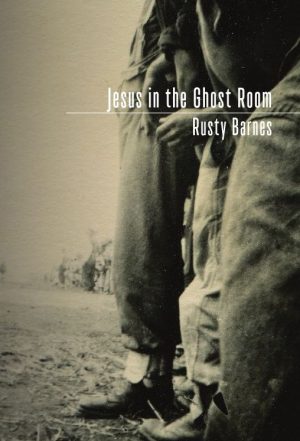 Hi all. Zvi Sesling wrote a short review of Jesus in the Ghost Room over on Doug Holder's Boston Area Small Press and Poetry Scene. I'm pleased to say he found it worth reading, and I hope you do too.
Hi all. Zvi Sesling wrote a short review of Jesus in the Ghost Room over on Doug Holder's Boston Area Small Press and Poetry Scene. I'm pleased to say he found it worth reading, and I hope you do too.
If you're still on the fence about it after Zvi's word, here's what Bill Soldan had to say about it in a recent Amazon review:
As Barnes grapples with what it’s like to be an individual, to feel lonely in a world of difference and contention and uncertainty, to reconcile one’s roots to one’s present circumstance, and to process the imminent death of our loved ones, among other universal crises of the heart, he leaves in each honed line a piece of himself, and we’re damn lucky to have him.
You can purchase a copy through Nixes Mate Books, via Amazon, or your local indie bookseller. In other poetry news, I'll have a rhyming poem coming up in the Five-Two, your weekly dose of crime poetry, and I'll blast the link on social media when the time comes.
My recent Kraj novel has shuffled off its mortal coil. I just can't do the sections set in the past justice to my satisfaction, nor afford to travel to Croatia to research further, and I'm not even entirely sure it's my story to tell anymore. I've written a lot of Kraj stories set in the present, but writing the events of his formative years, during the very complex wars in the region, despite all my research, is beyond my capability right now. It may not always be so. I'm still reading about the time period, still seeking out other novels, all in all still very much interested. But the writing has ground to a not unwelcome halt. I bitched on Facebook about it already, so no need to commiserate; besides, I've another novel in progress already, it's just too early to talk about it.
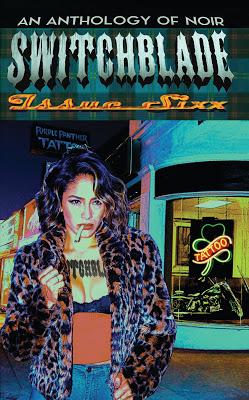 Having said that, I'm concentrating on poetry for the time being, drafting three or four poems a day and hoping one of them will end up a keeper, and researching new markets for the stuff. I also have some short stories in the works, and another one available in the recent Switchblade. If dark and nasty trips your trigger, this one may be for you. As one Amazon reviewer put it, "Rusty Barnes nailed it with an unexpected tale of bad guys who did badder things–things I couldn't believe. And the skank in that story…wow." You can find Switchblade Sixx on Amazon in print or Kindle form.
Having said that, I'm concentrating on poetry for the time being, drafting three or four poems a day and hoping one of them will end up a keeper, and researching new markets for the stuff. I also have some short stories in the works, and another one available in the recent Switchblade. If dark and nasty trips your trigger, this one may be for you. As one Amazon reviewer put it, "Rusty Barnes nailed it with an unexpected tale of bad guys who did badder things–things I couldn't believe. And the skank in that story…wow." You can find Switchblade Sixx on Amazon in print or Kindle form.
Personal and Publication Updates
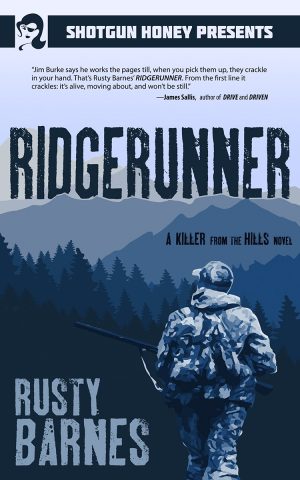 Hi all. I usually don't post much personal stuff here except book announcements and the like. There's been so much going on lately, though, I feel as if I should post something. I've taken time off from new stuff only to revise the next book in the Killer from the Hills series, The Last Danger, which appears in October from Shotgun Honey/Down & Out Books.
Hi all. I usually don't post much personal stuff here except book announcements and the like. There's been so much going on lately, though, I feel as if I should post something. I've taken time off from new stuff only to revise the next book in the Killer from the Hills series, The Last Danger, which appears in October from Shotgun Honey/Down & Out Books.
I have five–count them, five–new stories coming out in the next few months to a year, a flash piece coming out soon in Shotgun Honey, then also stories in Toe Six, Mystery Tribune, Switchblade and Goliad Review. Goliad Review will feature the longest story I've written since grad school, around 9000 words.I haven't had a short-story run like this in quick succession since the early to mid 2000s, when I published the majority of my short stories, before switching over to novels. I'm also happy that four of those feature Kraj, a Croatian hitman who's appeared before in Manslaughter Review, Full of Crow, Revolution John, Plots with Guns, and Bull (that story was a Derringer Short Story Award finalist for 2017) and happier to report I have a complete–still untitled– novel draft featuring Kraj. I'm still researching it in spurts and revising heavily, and hope to have it in submittable form before summer 2019, plus several more Kraj short stories which form a narrative arc.
I've worked on and researched for Kraj off and on since 2015, My first novel took a year and half to write. Kraj will end up taking three, one year to draft, one to research, one to rewrite. I'm going to be proud and nervous both to get that out in the world, just because I've taken so much time with it. I don't want to screw it up, having taken so long, and I'm trying to write it in such a way that the research doesn't show. Most of the action takes place in the present, but key scenes occur in Croatia in the 90s, a time of war and great turbulence, to say the least, and I want to make sure I get it as right as I can.
Tough is moving along nicely, with the first print collection due out in July, and every week a new story or review published. Matthew Lyons's story "The Brother Brujo" will appear in Best American Short Stories 2018, edited by Roxane Gay, and I have high hopes that stories from 2018 will appear in the other annual prize anthologies for 2018 and 2019. I'm certainly going to be nominating various pieces individually, and having the print collections to submit this tear en masse, as it were, will help me get taken more seriously (by which I mean multiple anthology appearances), keep the Tough name in people's ears and help build reputations for writers and Tough alike.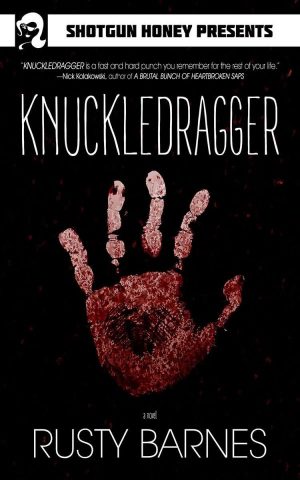
Otherwise, I'm reading as much as I can with home repairs and summer busyness going on. Highlights of the past six months include the new Laura Lippman, Sunburn, and Zagreb Exit South by Edo Popovic, and Zagreb Cowboy by Alen Mattich. I'm also making my way slowly through the Black Lizard books published and republished in the 80s with Barry Gifford at the helm. Detour, by Helen Nielsen, and Swamp Sister, by Robert Alter, among them. And the Big Book of the Continental Op, by Dashiell Hammett. I'm also reading in manuscript or ARC several forthcoming books: one by Jay Gertzman, writing about David Goodis, due out soon from Down & Out Books, and books by Brian Tucker, Matt Phillips, Charles Dodd White and Bill Soldan.
That's about it. I'm going to hunker down, revise some, read a lot, and try to enjoy the rest of the summer. I hope you do the same.
Books to Look For: Blood in the Hills, ed. Bruce E. Stewart
This is one to check out. RB.
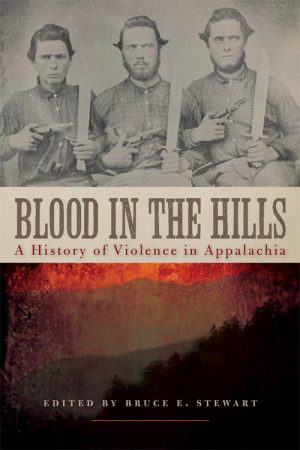 From Appalachian Today's Jessica Stump:
From Appalachian Today's Jessica Stump:
BOONE, N.C. — “Blood in the Hills: A History of Violence in Appalachia,” which is edited by Dr. Bruce E. Stewart, associate professor in Appalachian State University’s Department of History, is now available from the University Press of Kentucky in paperback format.
The volume features essays from experts in political science, history and literature that question the supposedly innate brutality of the Appalachian people, examining cases within the region from the late 18th to early 20th century.
"Blood in the Hills” was originally published by the University Press of Kentucky in November 2011 and is part of the press’ New Direction in Southern History series.
The press’s website states, “Editor Bruce E. Stewart discusses aspects of the Appalachian violence culture, examining skirmishes with the native population, conflicts resulting from the region’s rapid modernization, and violence as a function of social control. The contributors also address geographical isolation and ethnicity, kinship, gender, class, and race with the purpose of shedding light on an often-stereotyped regional past."
Mystery Tribune Issue No. 4
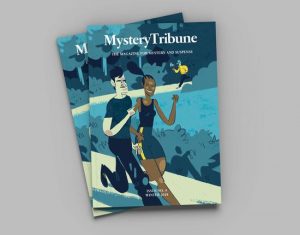 Mystery Tribune Issue No. 4
Mystery Tribune Issue No. 4
Winter 2018
The Magazine for Mystery and Suspense
236 pages
Edited by Ehsan Ehsani
The first story in the Winter 2018 issue of Mystery Tribune, "A Friend Indeed" by Brendan DuBois, effectively sets a tone.The discursive narrator, software designer Caleb Willis, tells us everything we need to know in the first long sentence of the story: "So after my second mistrial and my final release from county prison, I decided to take up walking, since there's not much to do with my life after I had been accused of murdering my best friend, who also happened to be sleeping with my wife, while also in the process of stealing my company." After a little backtracking, the story unfolds neatly, following that old dictum: the journey's the thing, not the destination.
The second story, "The Current," by Dan J. Fiore, features one of the best descriptions I've ever seen of being accidentally drunk, the details coming through loudly and in in near-hallucinatory detail. "It feels like there's a wall in Shawn's mind, a brick wall just behind him blocking out everything that came before. Thinking, remembering–it's like banging against the bricks and the wall moves and shakes and bends and bits get through but not enough to see. Not enough to understand." Poor Shawn, a nine-year-old kid, is drunk, found by a father who's inconsistent and a liar at best and retrograde asshole at his worst. Bad shit ensues, but as the story closes, Shawn "knows that hidden under it all, beyond the darkness and chaos, is a place where it's calm and quiet and finally still." This is a story I didn't expect to like as much as I did in the end.
"Kill One, Get One Free," by David Rachels takes an old saw, the gangster making his bones, and injects some mean lines and life into it. "This was the first moment I understood what I was signing up for–what I had already signed up for. It was kill or be killed. At once, killing this old lady seemed like an act of self-defense. I felt my conscience relax." This brings us into the mindset of our almost-hitman, but there's still a turn to come, and it's a good one. It also features my favorite ending of the stories I read in this issue, a conclusion both satisfying for the story and intriguing enough to want to read more about this character. Plus, you hear writers quote someone famous about the power of the appropriately placed period; this story's only exclamation point does the same thing, but better.
Todd Scott's "Wolf bite" is the third story to feature a dog prominently. This particular beast is one to remember. "It comes at him fast from the other side of the trailer. Low to the ground, throwing dust and rocks. Head as big as a fucking mailbox. Maybe a dishwasher, with a whole dinner setting worth of teeth, shined up bright. It's a fucking shark on brindle legs. Barking its goddamn head off." This is Tommy Dale Keegan's dog, both dog and owner bad actors, and the Midland Police Department, in the person of Ben Harper, has to shoot one of them. The first line tells the story: Ben Harper doesn't shoot the dog, even after he gets bitten. This is a really fine piece, discussing both man and dog, and man and woman, the two strains tied together skillfully and irresistibly. Plus, I'm a sucker for s good dog story.
A story of another kind entirely, "Death In Florence" by Nick Kolakowski brought me to a place I've never been and planted me squarely on terra firma. "Despite the constant threat of vehicular slaughter, I love this place: the tall sidewalks lined with candy-colored mopeds, the imposing wooden doors plastered with flaking posters, the cries of ambulances and sparrows, the Senegalese dealing postcards and cheap trinkets from cardboard stands (all the better to fold away when the Carabinieri make an appearance)." The rest of this well-structured story details a woman on a quest that isn't all it seems to be, with a twist I didn't see coming at all. The best kind of story, this one demanded a reread immediately to find the clues the author left behind.
"Oil Down," too, relies on setting to convey its power, particularly in writer Brian Silverman's descriptions of or mentions of food. The mentions range from roti to Carib beer to Stallion overproof rum, but in particular, oil down, "a one pot stew featuring salted meats, greens, provisions like breadfruit or cassava and cooked slowly in coconut oil and coconut milk often served at Sunday dinner" all of which sets a scene as capably as any more typical description of landscape or people. The story itself involves the death of a vagrant, called Filthy Man, and the efforts of a local bar owner, Len Buonfiglio, a refugee from New York, to solve the possible murder with the assistance of several locals. This piece has the feel of a novel about it, and one hopes we'll see more of Mr. Len's story somewhere else.
"Dad" by Hugh Fraser closes out the fiction in this issue. A short vignette about the narrator's troubled relationship with his father, this piece deals more with the aftermath of a crime than the committing of one, and seems a more subtle tack to take in the midst of the other more traditional narratives in the issue. The story opens as the narrator remembers his life with his father. "At least the waiter has only one taste of his garbage, he has no idea what it was like to live with it for thirty seven years. Every goddam thing he ever said to me, since I can remember, was some way of making himself feel good at my expense." Needless to say, this isn't going to end well for anyone involved.
Fiction is obviously the main attraction for me, but beside the stories, there's a Q&A with Rick Geary, revealing interviews with Tom Sweterlisch, Nick Petrie and Sean Phillips, and a review of James Anderson's Lullaby Road. Plus, there's an article by Elena Avanzas Alvarez called "Psychopaths in Crime Fiction." I don't know enough about photography to comment deeply, but photographers Malgorzata Sajur and Ashley Joncas held and rewarded my interest. The added bonus of photo illustrations for each story is a great thing I wish more journals could afford to do.
Overall, this is a strong issue of Mystery Tribune, a magazine I'll return to in the future. You can subscribe for $48 yearly (four issues) or buy single copies at www.mysterytribune.com, and you should if you're interested in contemporary crime fiction.







